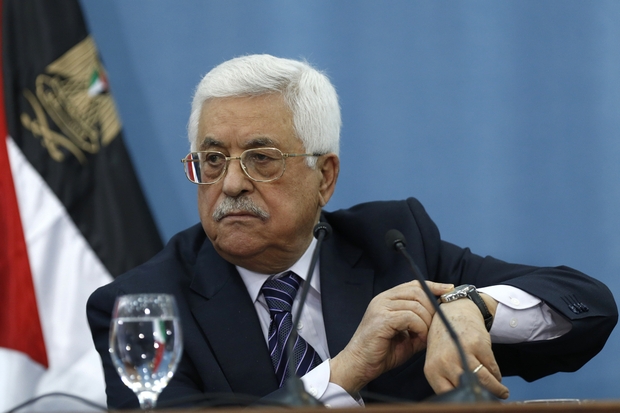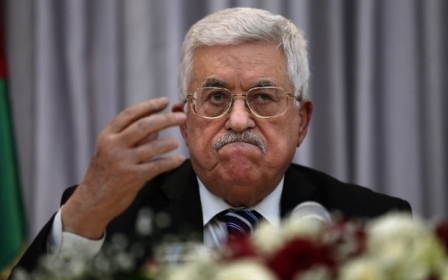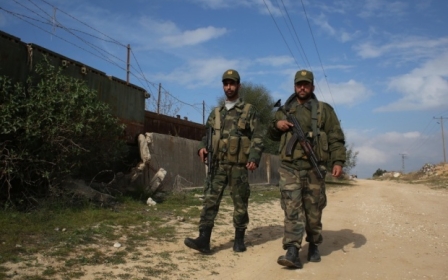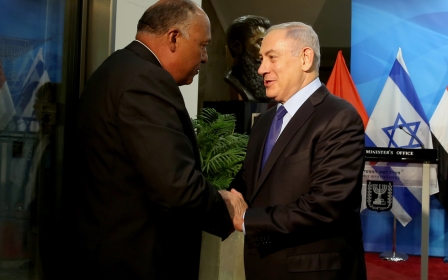Mahmoud Abbas's last stand

The Palestinian president was angry: “No one dictates an opinion to us. We are the decision makers and we are the ones who decide and the ones who implement and no one has authority over us. This is what we want,” he boomed in a video broadcast on Sunday.
On the face of it, it is somewhat late in the day for Mahmoud Abbas to be banging his fist on the table. He is 81 and is regarded as an irrelevance by Israel. That point was made with brutal clarity by Russia’s Middle East envoy Mikhail Bogdanov. He informed a Palestinian delegation in Ramallah on Tuesday that Benjamin Netanyahu was no longer interested in talks with Abbas.
A Palestinian official present at the meeting told MEE: “Bogdanov told us frankly that Netanyahu not only rejected the Palestinian demands for the meeting, like the settlement freeze and the release of the pre-Oslo prisoners, but also says that meeting Abbas is no longer his priority.”
According to Bogdanov, Netanyahu said: “When I make peace with the Arabs, Abbas will join us, so let him stand alone.”
Oslo is dead. The Palestinian parliament has not met for nine years. Abbas’s term as president ran out seven years ago. The PLO is patently not the “sole representative of the Palestinian people” and if an election to that body were held, Hamas would probably edge it, especially in the refugee camps.
Fatah itself is in an advanced state of decay. It's so riven with tribes and factions that when a congress was being planned, and there was a debate about whom to invite, the only criterion they could agree on was who was on the payroll.
Abbas is one of the last tenants left in a structure that is largely empty. He may be angry or bitter, but his outrage is difficult to fathom. Whom was his outburst aimed at? At Netanyahu’s visit to Moscow?
Abbas was quite explicit about whom he was talking: “Because there are people who work in certain capitals. Save ourselves from these capitals and save ourselves from the money of the capitals. Save us from the influence of the capitals. We want to work as Palestinians. Can we do this? This is what is required of us.”
This could only have been aimed at Mohamed Dahlan, the Fatah strongman he once expelled. Abbas's speech followed two news reports from Amman. The official Jordanian newspaper al Rai claimed the Central Committee of Fatah decided to accept the return of people close to Dahlan and there were attempts to return Dahlan himself.
A Fatah committee is indeed looking at ways in which Dahlan’s people could return home. But the Jordanian story explicitly referenced the plan’s foreign sponsors.
It said the initiative to force a reconciliation between Abbas and Dahlan was happening under the auspices of Jordan, Egypt, Saudi Arabia and the Emirates.
A second report by Quds news agency quoted Palestinian-Jordanian writer Hamadah Fara’nah, who is known to have good connections to the Jordanian authorities, as saying: “This will take place in three steps. First, Fatah’s two wings would be united. Second, the ramifications of the coup, division and reconciliation between the movements of Fatah and Hamas will be addressed. Third, moves will be undertaken at the international level in order to activate the path of Palestinian-Israeli negotiations in Cairo, Paris and Moscow.”
This was the plan I first revealed in the Middle East Eye in May. Its authors use the touchy feely language of mediation. They are trying to frame Dahlan’s return as a reconciliation between feuding rivals. But Abbas is long enough in the tooth to know what would happen if Dahlan himself was allowed home in Fatah’s current state.
With Marwan Barghouti in an Israeli prison and likely to remain there, and Abbas on his way out, Dahlan would become the power behind the throne in all three positions currently occupied by the incumbent - the head of Fatah, the PLO and the PA. If Dahlan got one of these posts, he would control whoever served in the other two.
Abbas is fighting a rearguard action against this happening and it will probably be his swan song. For Fatah leaders like him, the peace process was a slow political death. Belatedly, he is fighting to regain the legitimacy as president which he lost as negotiator.
To unite his party, the Prime Minister Rami Hamdallah announced local elections on 8 October. Fatah controls the electoral lists and so far the results of this tactic have been mixed.
Abbas has got Dahlan, under Egyptian pressure, to withdraw his own lists of followers. Dahlan agreed to support Abbas’s lists, but the quid pro quo is that Abbas has been forced to allow Dahlan’s closest men to return.
A senior Fatah member told MEE: “Abu Mazen insists that he will not allow Dahlan back, despite the pressure of Jordan, Egypt and the Emirates. He said that he has not agreed to Dahlan’s return, but he has allowed back other people from Dahlan’s camp who were ousted from Fatah.”
The deal over electoral lists just kicks the can down the road, as each Fatah faction will claim ownership of a list which may not be loyal to them. Take Hamas, whose participation in the election surprised Hamdallah. All their lists are working with Fatah and other factions. Hamas is not campaigning under the same name everywhere. In each council, Hamas candidates will run under different list names.
This suits Hamas, as joint lists allow their members to work with Fatah and others, and to achieve a level of co-operation at the local level denied to them by Abbas at the national level. It's clear that Hamas cannot run freely in the West Bank. That much was obvious when, two days after being elected as the Hamas representative on the High Commission for Elections, Hamas leader Abu-Kwaik was arrested by Israel and sent to prison for six months.
But will this bolster Abbas? Strong arm tactics are being used to bolt the electoral lists together.
Nablus had a popular mayor who was Islamist and backed by Hamas. In 2005, Adly Yaish won 74 percent of the vote. After seven years as mayor, he returned to his family business but then announced he would run again. There soon came a knock on his door. Five men appeared, among them Majid Faraj, the head the Palestinian Intelligence Service.
Faraj laid the deal on the line. If Yaish ran under a Hamas list, he would spend the next four years in an Israeli prison; he would be put on the US list, and he would lose his business. There was, however, a way of avoiding this unhappy outcome. Yaish must agree to head a Fatah list with eight men from Fatah and two from Hamas; he must agree to only do the job for two years, after which a Fatah man would take over.
In the end, Yaish agreed to most of what Faraj wanted: he would head a joint Fatah-Hamas list and do the job for two years. If and when Yaish is voted back in, to whom does Nablus belong - Hamas or Fatah? Both sides will claim it.
Faraj is one of the two names most often mentioned as Abbas’s choices to succeed him, the other being Saeb Erekat. Little of which cuts any ice with the Fatah rank and file who breathe defiance and are quite capable of showing it - with guns.
“Fatah is not an easy party and Abu Mazen will not be the man to shape its future. Any one member of the central committee could replace him as leader. Barghouti has a special place higher than the others, and if he were nominated he would win. But even if Abu Mazen promotes Faraj, Abu Mazen will not be the one who decides,” the senior Fatah member said.
There is another concern created by using a local election to fight a party leadership battle.
“My concern is that the PA used local elections to avoid the bigger ones, like elections to the PA or the Palestinian National Council. They are old and dysfunctional and need to be changed and renewed. Once you elect a local leadership without replacing the national one, you open the door to Israel cutting out the Palestinian leadership and dealing with the town and cities directly,” the Fatah source said.
This has a precedent. In 1976, Israel allowed local elections to take place in the West Bank to fashion an alternative leadership to the PLO. In front of the cameras, the PLO claimed victory when mayors they backed were swept to power. But behind the scenes there were tensions between Yasser Arafat and the newly elected mayors. The experiment ended when local mayors were targeted by a wave of bomb attacks from settlers in Gush Emunim.
Today Fatah is disintegrating without help from Israel. The hunt for a successor to Abbas appears to have narrowed down to a choice between one Palestinian security chief and another. One serves Israel’s interests directly in the West Bank, the other serves the Emirates and had strong links to Israel and the US.
Somewhere along the line, any quaint thought of electing a leader with democratic legitimacy in the Palestinian street has been jettisoned. Once it was America, alone, who had Israel’s back. Now four Arab states - Jordan, Egypt, the Emirates and Saudi Arabia - serve that role. The result, however, will be the same. No end of occupation for Palestine, and no end of conflict for Israel.
- David Hearst is editor-in-chief of Middle East Eye. He was chief foreign leader writer of The Guardian, former Associate Foreign Editor, European Editor, Moscow Bureau Chief, European Correspondent, and Ireland Correspondent. He joined The Guardian from The Scotsman, where he was education correspondent.
The views expressed in this article belong to the author and do not necessarily reflect the editorial policy of Middle East Eye.
Photo: Abbas is angry and his anger appears to be directed at Mohamed Dahlan (AFP)
This article is available in French on Middle East Eye French edition.
New MEE newsletter: Jerusalem Dispatch
Sign up to get the latest insights and analysis on Israel-Palestine, alongside Turkey Unpacked and other MEE newsletters
Middle East Eye delivers independent and unrivalled coverage and analysis of the Middle East, North Africa and beyond. To learn more about republishing this content and the associated fees, please fill out this form. More about MEE can be found here.





